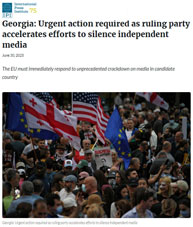
IPI: European Union Must Urgently Respond to Escalating Media Repression in Georgia
By Liza Mchedlidze
Tuesday, July 1, 2025
The International Press Institute (IPI) has issued a stark warning about the worsening state of media freedom in Georgia, calling on the European Union to take immediate and decisive action. According to a statement from the global media watchdog, the ruling Georgian Dream (GD) party is systematically dismantling press freedom through a wave of repressive laws and ongoing attacks on journalists.
"Each day, Georgia moves closer to becoming a fully consolidated authoritarian regime," the statement reads. "The ruling Georgian Dream party intensifies its efforts to erode democracy and silence independent voices."
IPI cited recent legal changes that make it easier to prosecute journalists for defamation, restrict reporting from courts, and remove key legal protections for the press. The statement specifically highlighted the continued pre-trial detention of journalist Mzia Amaglobeli, whose health has seriously declined while in prison. Despite medical warnings and defense motions, the Batumi City Court ruled on June 23 to keep her in custody.
IPI condemned the June 26 adoption of amendments to the Law on Freedom of Expression, which redefine defamation and shift the burden of proof onto journalists. Protections for those reporting in the public interest or acting in good faith have been removed, and retroactive prosecutions are now permitted for statements made up to 100 days before the law's enactment. Courts will now be able to impose significant financial penalties for both material and moral damages, even in cases where an apology has been issued.
"These amendments erode fundamental legal protections for journalism by eliminating source confidentiality, fostering self-censorship, and obstructing investigative reporting," IPI stated. "These combined changes threaten the very foundations of independent journalism in Georgia."
The new restrictions on court coverage also come under sharp criticism. Journalists are now barred from filming or recording inside court buildings, including hallways and courtyards. A system that previously allowed public broadcasting of court proceedings is being dismantled. The reforms coincide with sensitive trials involving individuals arrested during recent anti-government protests.
IPI says the laws were fast-tracked before Parliament's spring session ended and coincide with a broader pattern of political repression, including the arrest of seven opposition leaders, a former defense minister, and a former UNM member over the past month.
"Independent journalists have shown remarkable resilience in the face of growing pressure. They have been beaten, harassed, jailed, fined, and still continued their work," the statement notes. "But without legal protections, functioning institutions, and international pressure, the survival of independent journalism in Georgia is increasingly unlikely."
IPI accuses the Georgian government of copying tactics from Russia's authoritarian model, undermining democratic institutions, and pushing the country further from its European path. The group calls on the EU and its member states to apply effective pressure, not only on the Georgian Dream leadership but also on institutions and judges complicit in the crackdown.
"We renew our call on the Georgian Dream to repeal repressive laws, including the Foreign Agents Law and recent amendments to the Laws on Broadcasting and Grants. We urge Parliament to withdraw changes to the Law on Freedom of Expression and restrictions on media access to courts," the statement says.
IPI concludes with a call for the immediate release of Mzia Amaglobeli, describing her as a symbol of Georgian media's strength and resilience in the face of oppression.

